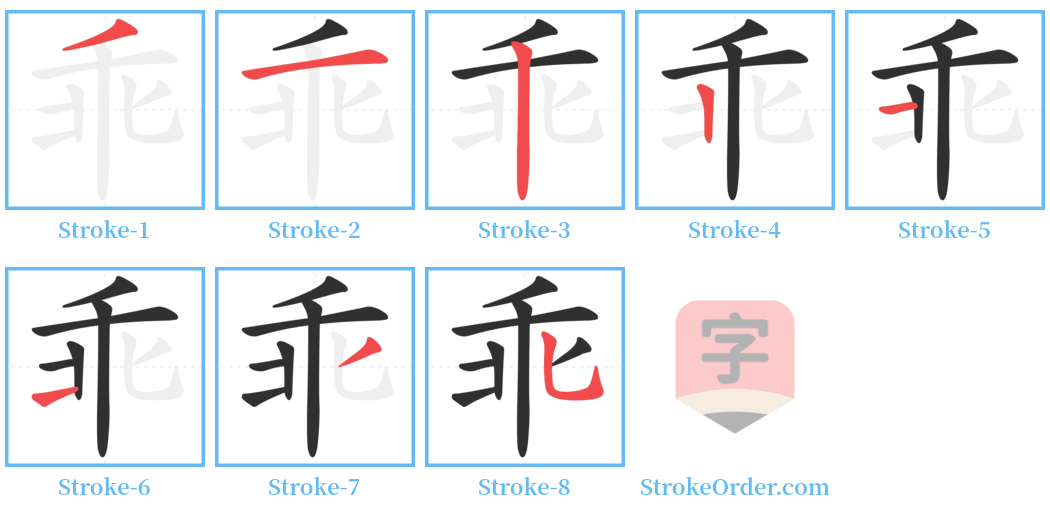乖 Stroke Order
Animated Stroke Order of 乖

Stroke Order Diagrams for 乖

Step-by-Step Handwriting Guide for 乖

Learn to Write Chinese Characters with Video Tutorials
Watch the video of writing the Chinese character "乖", learn the correct stroke order (笔顺) of the character "乖", and master the standard way of writing the character "乖".
Free Printable Handwriting Practice with Stroke Order: 乖
Printable Writing Practice Worksheet of "乖" in Portrait Orientation (Tian Zi Ge)

Printable Writing Practice Worksheet of "乖" in Landscape Orientation (Tian Zi Ge)

Information of 乖
Pinyin
guāi
Radical
丿
Strokes
8 strokes
Usage
★★★★★
Definition
(of a child) obedient, well-behaved / clever
乖 [guāi]
1. 不顺,不和谐。
(Not smooth, not harmonious.)
2. 机灵,伶俐(多指小孩听话)。
(Clever, smart (often referring to obedient children).)
---
1. 不顺,不和谐:~舛(谬误)。~谬。~戾(性情、言语、行为别扭,不合情理)。~僻(怪僻)。~张(怪僻,不讲情理)。出~露丑。
(Not smooth or harmonious: ~chuǎn (error). ~miù. ~lì (personality, speech, behavior is awkward, unreasonable). ~pì (eccentric). ~zhāng (eccentric, unreasonable). To expose ~ vulnerabilities.)
2. 机灵,伶俐(多指小孩听话):~~。~巧。卖~。~觉(jué)。~顺。
(Clever and smart (mostly refers to obedient children): ~ ~. ~qiǎo. To sell ~. ~jué. ~shùn.)
---
动 [guāi]:
【本义】:背离,违背,不和谐
(Original meaning: to deviate, to violate, to be disharmonious.)
【造字法】:会意。小篆字形,象羊角形,从“北”。从“北”,取其分背的意思。
(Character formation method: Pictophonetic. The small seal script character looks like a sheep's horn and includes “北” representing separation or divergence.)
1. 同本义 ([En.] perverse; violate)
2. 分离;离别 ([En.] separate)
3. 断绝;隔绝 ([En.] break off)
---
形 [guāi]:
1. 不同;差异 ([En.] different)
2. 反常;谬误 ([En.] abnormal; wrong)
3. 不顺利;不如意 ([En.] untoward)
4. 邪恶;奸滑 ([En.] wicked)
5. 表现好,顺从,听话 ([En.] good; obedient; well-behaved)
6. 灵巧,聪明,伶俐 ([En.] alert; clever)
7. 〈方〉∶漂亮 ([En.] handsome)
---
引:
1. 《说文》:乖,戾也。
("Shuowen": "guāi" means "perverse".)
2. 《贾子道术》:刚柔得适谓之和,反和为乖。
("Jiazidao's Dao": "Harmony is the balance of hardness and softness, while the opposite is guāi.")
3. 《楚辞·怨世》:吾独乖刺而无当兮。
("Chuci - Lament of the World": "I alone feel contradictory and unreciprocated.")
4. 《广雅》:乖,背也。
("Guangya": "guāi" means "to turn away.")
5. 《左传·昭公三十年》:楚执政众而乖。
("Zuo Zhuan - Annals of Duke Zhao": "In Chu, the officials conflicted.")
6. 晁错《论贵粟疏》:上下相反,好恶乖迕。
("Chao Cuo's Commentary on Skimping on Grain": "When upper and lower attitudes are opposed, likes and dislikes diverge.")
7. 唐·李朝威《柳毅传》:唯恐道途显晦,不相通达,致负诚托,又乖恳愿。
(Tang - Li Chaowei's "The Tale of Liu Yi": "Fearing that the path to the truth is dark, causing both misunderstanding and contradictory sincerity.")
8. 汉·王充《论衡·薄葬》:今墨家非儒,儒家非墨,各有所持,故乖不合。
(Han - Wang Chong's "Lunheng - On Simple Burials": "The Mohists and Confucians have diverged, each holding on to their views, thus they cannot harmonize.")
---
例:
又如:乖礼(违背成礼、定制);乖角(违背抵触);乖贰(背离;违异);乖背(违背);乖则(违反法则)
(For example: guāilǐ (to go against established customs); guāijiǎo (to contradict); guāièr (to diverge); guāibèi (to violate); guāizé (to break laws).)